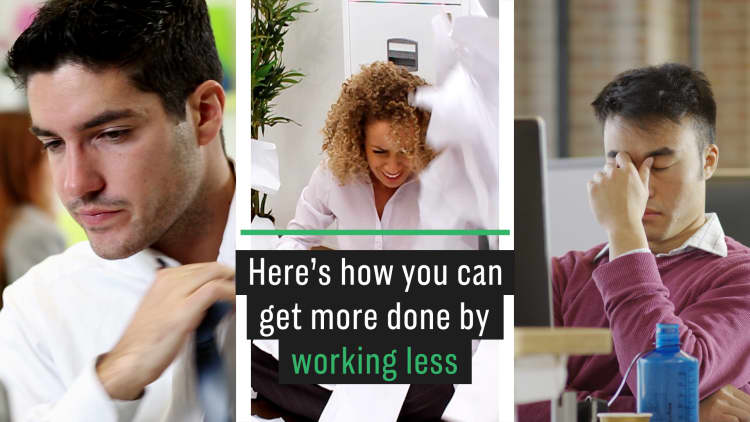Charles Darwin only worked about four hours a day and still was able to write "probably the single most famous book in the history of science," writes Alex Soojung-Kim Pang in the journal Nautilus. According to the Pang's research, Ernest Hemingway worked six hours a day, Gabriel Garcia Marquez hewed closer to five, Stephen King says anything over four is "strenuous," and Alice Munro, who won the 2013 Nobel Prize in Literature, sticks to three.
These creators aren't lazy: They're efficient. And now there's a wealth of evidence to suggest that a few hours of intensive practice a day, as opposed to a couple four-hour blocks sandwiching a brief lunch break, is optimal for achieving success.
Basically, science shows, you can get more done in less time. And, by working too much, you might be holding yourself back.
But before you reduce your hours, you have to know how to use your hours the right way.
The psychologist Karl Anders Ericsson, who ran a famous study assessing what set apart the best violin students from the others at a Berlin conservatory, calls the best, most productive work "deliberate." That mean it's "engaging with full concentration in a special activity to improve one's performance."
Likewise, Cal Newport, an assistant professor of computer science at Georgetown University, calls it "Deep Work" in his book about how to "wring every last drop of value out of your current intellectual capacity."
Here's how to work deliberately and efficiently so you can do less and accomplish more.
Focus
Newport points to the unbelievably productive life of Theodore Roosevelt. Elected at 42, the youngest U.S. President part-timed as a boxer, poet and naturalist. He was an insatiable reader, sometimes finishing an entire book before breakfast, and a prolific writer. He published nearly 50 books and, by one estimate, completed over 150,000 letters.
It was not long hours, Newport argues, that made Roosevelt a success. In fact, the President napped regularly, even as an adult, and he achieved high honors at Harvard only studying a few hours a day while pursuing a number of extracurriculars.
What mattered was the focused way he worked during those few hours: He put everything else aside and invested himself entirely in the task at hand.
To be sure, like the examples Pang uses, Roosevelt is exceptional. He was once shot before a speech and still gave it. But anyone can improve by getting better at keying in.
Don't multitask
Distractions abound, but to work in an efficient, focused way, you need to ignore them. In the Age of Smartphones and quick dopamine hits, you're probably bad at this. A 2015 study pegged the average attention span at eight seconds. That's shorter than a goldfish's.
The consensus among experts is that trying to do multiple things at once limits you.
Daniel Weissman, a neuroscientist at the University of Michigan, ran a study in which subjects sat inside of MRI scanners and had to decide which of two differently colored numbers on a screen was larger. Weismann found that before subjects provided an answer, they paused because they had to mentally round up the information about one color's task and push aside the other's.
"Even simple tasks can overwhelm the brain when we try to do several at once," he concluded.
In another study, just listening to background music made subjects' performance worse on a memory task.
Some scientists don't even think multitasking is real. When you think you're doing two things at once, they claim that in actuality you're just jumping between the two, which is mentally exhausting.
In any case, the science agrees that focusing on a single task is best.
Take good breaks
Research also shows that you can't maintain brain power throughout an entire work day without rest, reports Quartz. Some studies have found that workers are more productive when they have at least a 15-minute break every couple of hours.
In order to be a good break, it cannot be spent reading the news or scrolling through Twitter. You must actually rest your mind and let it wander.
In reference to Ericsson's Berlin conservatory experiment, Pang notes, "The top students were applying some of the habits of deliberate practice — mindfulness, an ability to observe their own performance, a sense that their time was valuable and needed to be spent wisely — to their downtime." They not only worked deliberately. They rested deliberately, too.
Nap
In another experiment highlighted by the New York Times, researchers tested subjects' perception four times throughout a day and found that performance on each test got successively worse. But the performance of those who took a 30-minute nap between tests did not decline, and the results of those who took a 60-minute nap actually improved.
A nap "can help with alertness and perception and cut through the general fog that creeps in during the day," researchers conclude. So "take naps at work" and "apologize to no one."
Roosevelt took naps even into adulthood, as did various American presidents that succeeded him. Other proponents of the occasional snooze include other successful leaders like Margaret Thatcher, Albert Einstein, Winston Churchill, Kim Kardashian and Kanye West.
Of course, this is not to say you won't still have to work a lot to achieve success. You will. Even Pang concedes you will still need those 10,000 hours. It's just worth considering how you will accumulate them, because Roosevelt, Darwin and many others who chased and eventually caught their dreams didn't do it by sitting down to work at nine and getting up at five.
Like this story? Like CNBC Make It on Facebook!
Don't miss: Oxford neuroscientist: These futuristic brain enhancements will be available sooner than you think




